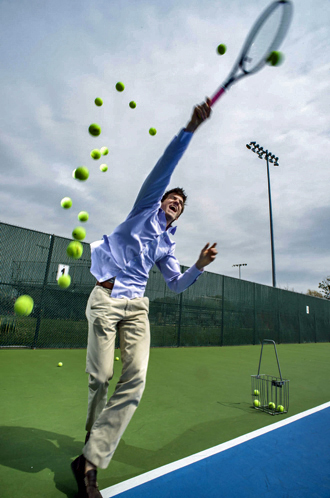Ever wonder why you seem to make the same mistakes over-and-over? Ever considered whether chimps might have creative problem-solving skills? Ever thought your dog was tuned in to what you were thinking?
Paul Holden, Lake Highlands High School 2013 grad and student at Yale University, ponders an array of fascinating questions all day. What makes humans unique? Why do we learn more efficiently than animals? Why do humans make systematic mistakes in some tasks?
In a new study, Paul is teaming up with Yale professor Laurie Santos and graduate student Angie Johnston at the university’s Comparative Cognition Lab. I interviewed Paul by email from Spain, where he is currently in a study abroad program.
“We are interested in why humans have a cognitive trait called ‘overimitation’,” says Paul, “where young children, after being shown how to do a task in an inefficient way, will continue to solve it the same way, even after a better solution is evident.”
Chimpanzees, despite being one of our closest relative, he says, don’t.
“The current theory says that humans have certain innate expectations that, when we are taught things, allow us to generalize knowledge and learn much faster than animals, but this comes at a cost – the so-called ‘overimitation’ or error in problem-solving skills.”
Watching the teacher doing it wrong, in other words, can hinder a child from doing it correctly.
“Chimps have similarly advanced cognitive abilities to humans,” continues Paul, “but unlike our dogs, they don’t understand social cues like pointing and eye contact. Dogs over thousands of years living with humans have developed a social intelligence not seen in chimps.”
Paul’s group was interested in finding out if canines, so tuned in to people, would make the same learning errors of overimitation as human babies. (They didn’t.)
Is this kid really just a college junior?
Paul says he heard about the lab when Santos guest -lectured in his psychology class, and he soon applied to work as a research assistant in the Canine Cognition Center.
“The lab quickly became one of my favorite parts of college. I worked with dogs and was treated as a colleague by graduate students and my professor. Laurie [she prefers students call her by her first name, he says] deserves credit for creating an environment of collaboration – she gives undergraduates a chance to do real science.”
Paul has plenty of praise for his teachers and teammates at Yale, but he’s equally as effusive about his Lake Highlands High School mentors.
“Though almost all of my teachers had a positive impact on me, I try to keep in touch with Luciana Lang, Casey Boland and Tracey Bishkin. All three encouraged and challenged me and helped me find my intellectual curiosity.”
“I taught Paul when he has at the Lake Highlands Freshman Center,” says Lang. “Although he excelled in my class as far as grades are concerned, he was never just satisfied with getting an A. He wanted understanding. One memory stands out most: I remember doing a very intensive 2-day plant lab. Students who wanted extra credit could do optional enrichment questions about plant adaptations. I knew some students did additional research in order to answer the questions. However, I was taken aback when Paul came to me during lunch because he was thinking a lot about the question and he wanted extra time to try and figure it out. He ran some ideas past me and it became clear to me that Paul was thinking on a deeper level. I gave him some directions he could go in and some ideas for consideration. Paul must have gotten permission to leave his other class, because he rushed in during my conference period with paper in hand. I recall him feeling satisfied and excited about his response and wanting to get it to me at that moment. Scientific writing and research at this level seems like a natural progression for a young man with his analytical abilities.”
Bishkin agrees.
“During his time at LHHS, Paul was such as curious student. While I think Paul’s goal was always to go to medical school, he was greatly interested in scientific research. In my AP Psychology class, he was especially curious about research in Social Psychology and would always do additional reading outside the curriculum. I probably learned more about Social Psychology from Paul than I did from any seminar I attended.
“It didn’t surprise me that he sought out the most famous of Yale’s Psychological Researcher, Laurie Santos, to further feed his curiosity. Her work studying animal social behavior has become a wonderful source of comparison for human social behavior. And Paul is right in the middle of it.”
When he’s home for school breaks, Paul likes to find himself in the middle of a good ole Dallas taco.
“My parents [Anne Cameron and George Holden] still live in Lake Highlands, and other than my dogs Bella and Ringo, I’d say I miss them and tacos the most.
You can see the results of the Yale study here and here.






